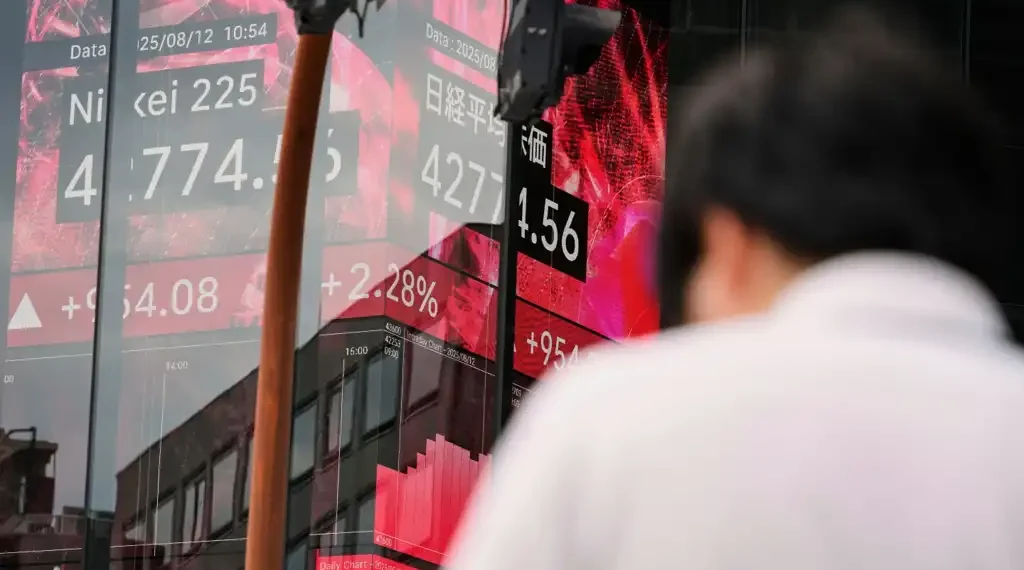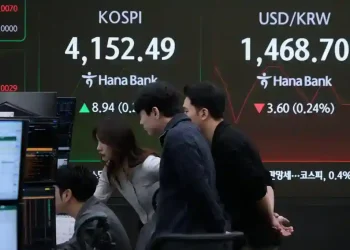Global Shares Climb on Trump’s Decision to Delay Higher China Tariffs
Published Time 08-12-2025, 18:45
Global financial markets mostly advanced on Tuesday after U.S. President Donald Trump announced a 90-day delay in increasing tariffs on Chinese goods. This move has temporarily eased trade tensions between the world’s two largest economies, encouraging investors amid ongoing uncertainty.
Global Markets React Positively to Tariff Delay
In Europe, France’s CAC 40 inched up 0.1% to 7,706.59, while Britain’s FTSE 100 gained 0.3%, reaching 9,154.82. Germany’s DAX experienced a slight dip of 0.4%, closing at 23,990.54. U.S. stock futures also reflected cautious optimism, with the S&P 500 and Dow Jones Industrial Average futures up by approximately 0.1%.
Asian markets demonstrated stronger gains, led by Tokyo’s Nikkei 225, which surged 2.2% to close at 42,718.17, surpassing its previous all-time high. Japanese corporate shares rallied on the news that U.S. tariffs on imports from Japan would be fixed at 15%, avoiding “stacking” on existing duties.
Toyota Motor Corp. shares jumped nearly 3%, while Honda Motor Co. rose 2.6%. Tokyo Electron and Sharp recorded gains of 1.1% and 11% respectively. Notably, Sanrio, the company behind Hello Kitty, saw its shares climb 16%, and watchmaker Seiko added nearly 14%.
Hong Kong’s Hang Seng Index increased by 0.3% to 24,969.68, and China’s Shanghai Composite rose 0.5% to 3,665.92, buoyed by positive trade developments.
Trade War Tensions Temporarily Eased
President Trump’s executive order on Monday paused the planned tariff hike on Chinese goods, initially set to increase from 30% to a higher rate. The delay allows both countries additional time to negotiate a broader trade agreement. Without the extension, Beijing was expected to retaliate with increased tariffs on U.S. exports.
China responded by issuing a statement endorsing the tariff pause, highlighting both nations’ commitment to ongoing talks. Despite the reprieve, uncertainty lingers for businesses, as the potential for renewed escalation remains.
Stephen Innes, Chief Global Market Strategist at SPI Asset Management, explained, “The extension isn’t about goodwill; it’s about keeping oxygen in the room for deals that matter,” emphasizing the strategic nature of the delay rather than a permanent resolution.
Mixed Regional Market Movements
Elsewhere in Asia, Australia’s S&P/ASX 200 rose 0.4%, closing at 8,880.80, while South Korea’s Kospi fell 0.5%, ending at 3,189.91. These mixed results reflect varying regional sensitivities to global trade dynamics.
In the U.S., stocks experienced a mild pullback on Monday, with the S&P 500 down 0.3%, the Dow Jones Industrial Average falling 0.5%, and the Nasdaq Composite decreasing 0.3%.
Inflation Data in Focus Amid Trade Uncertainty
Investors are awaiting a key report on U.S. inflation, due later Tuesday. Economists predict a 2.8% year-over-year increase in consumer prices for July, slightly above June’s 2.7% figure. Rising costs in groceries, gasoline, and other essentials continue to pressure household budgets.
Although inflation has significantly cooled from its peak of over 9% three years ago, it remains above the Federal Reserve’s 2% target. The ongoing tariff disputes risk further price increases, intensifying fears of “stagflation”—a scenario where economic growth stalls while inflation stays high.
The Federal Reserve faces a difficult balancing act, as measures to control inflation, such as raising interest rates, could potentially weaken the job market and economic growth.
Energy and Currency Markets Update
In commodity markets, benchmark U.S. crude oil prices edged lower by 16 cents to $63.80 per barrel, while Brent crude slipped 9 cents to $66.54 per barrel.
Currency trading saw the U.S. dollar strengthen slightly against the Japanese yen, moving from 148.15 to 148.46 yen. The euro dipped marginally to $1.1617 from $1.1618, reflecting ongoing market volatility amid global economic uncertainty.
This article was rewritten by JournosNews.com based on verified reporting from trusted sources. The content has been independently reviewed, fact-checked, and edited for accuracy, neutrality, tone, and global readability in accordance with Google News and AdSense standards.
All opinions, quotes, or statements from contributors, experts, or sourced organizations do not necessarily reflect the views of JournosNews.com. JournosNews.com maintains full editorial independence from any external funders, sponsors, or organizations.
Stay informed with JournosNews.com — your trusted source for verified global reporting and in-depth analysis. Follow us on Google News, BlueSky, and X for real-time updates.














